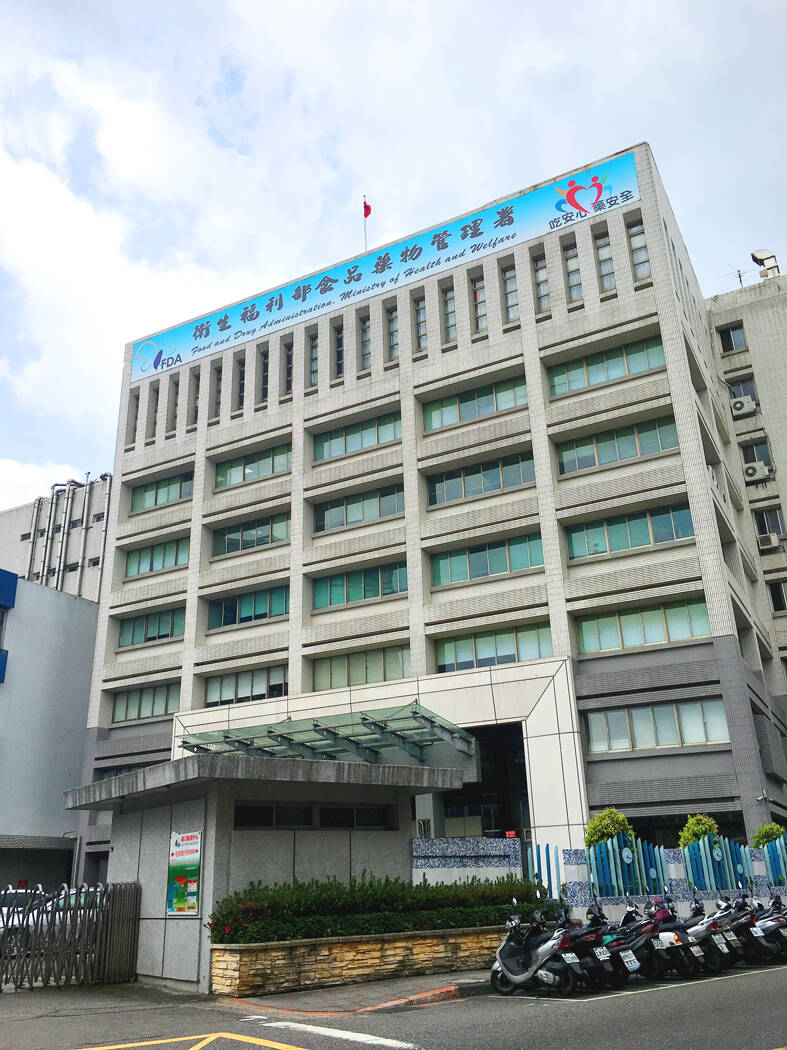Some products bought in pharmacies, including tampons and adhesive bandages, are listed as “medical devices” in Taiwan and may not be resold, the Food and Drug Administration (FDA) said yesterday.
Many people did some spring cleaning before the Lunar New Year holiday and might have found unused items, or they might have purchased too many products from pharmacies while traveling abroad during the holiday, but people should determine if the items are considered medical devices before selling them, the FDA said.
Medical masks, adhesive bandages, gauzes, medical cotton swabs, condoms, tampons, menstrual cups, contact lenses, contact lens cases, contact lens solutions, nasal aspirators and liquid medication dispensers are medical devices commonly mistaken as general goods, it said.

Photo: Chung Li-hua, Taipei Times
People who do not have a medical device business permit issued by the FDA are not permitted to sell medical device products, whether through online platforms, in physical stores or by delivering the items by hand, the FDA said.
People who do so might be fined between NT$30,000 and NT$1 million (US$959 and US$31,966) in accordance with the Medical Devices Act (醫療器材管理法).
The FDA last year said vaginal infections can be more common in the winter, because some women like to wear tight, heavy and less breathable clothing, which could lead to the development of symptoms such as irritation, discharge and itching of the vagina and the vulva.
Some of those women might turn to intimate cleansing and care products, such as a “therapeutic vaginal douche apparatus” — a device that delivers a stream of liquid (douche solution) into the vaginal cavity for medical or hygienic purposes — but that is also a medical device, so the production and sales of the product require a permit, the agency said.
The apparatus is mainly used for medical treatment, rather than for daily general hygiene purposes, so people should carefully read the instructions, the FDA added.
People who independently purchase medical devices should follow three safety rules, it said.
These are identifying whether the products are medical devices, checking the medical device license number or listing number that is required on the product label, and carefully reading the instructions on how to use them correctly and safely, the agency said.
People who want to look up a medical device’s permit and its registered information can go to the FDA’s database (https://lmspiq.fda.gov.tw) for confirmation, it added.
If people develop an adverse reaction after using a medical device, they should report it to the Ministry of Health and Welfare’s National Adverse Drug Reaction Reporting System by calling (02) 2396-0100 or the FDA’s website (https://qms.fda.gov.tw), it added.

DEFENSE: The National Security Bureau promised to expand communication and intelligence cooperation with global partners and enhance its strategic analytical skills China has not only increased military exercises and “gray zone” tactics against Taiwan this year, but also continues to recruit military personnel for espionage, the National Security Bureau (NSB) said yesterday in a report to the Legislative Yuan. The bureau submitted the report ahead of NSB Director-General Tsai Ming-yen’s (蔡明彥) appearance before the Foreign and National Defense Committee today. Last year, the Chinese People’s Liberation Army (PLA) conducted “Joint Sword-2024A and B” military exercises targeting Taiwan and carried out 40 combat readiness patrols, the bureau said. In addition, Chinese military aircraft entered Taiwan’s airspace 3,070 times last year, up about

The Overseas Community Affairs Council (OCAC) yesterday announced a fundraising campaign to support survivors of the magnitude 7.7 earthquake that struck Myanmar on March 28, with two prayer events scheduled in Taipei and Taichung later this week. “While initial rescue operations have concluded [in Myanmar], many survivors are now facing increasingly difficult living conditions,” OCAC Minister Hsu Chia-ching (徐佳青) told a news conference in Taipei. The fundraising campaign, which runs through May 31, is focused on supporting the reconstruction of damaged overseas compatriot schools, assisting students from Myanmar in Taiwan, and providing essential items, such as drinking water, food and medical supplies,

STRICTER ENFORCEMENT: Taipei authorities warned against drunk cycling after a sharp rise in riding under the influence, urging greater public awareness of its illegality Taipei authorities have issued a public warning urging people not to ride bicycles after consuming alcohol, following a sharp rise in riding under the influence (DUI) cases involving bicycles. Five hundred and seven people were charged with DUI last year while riding YouBikes, personal bicycles, or other self-propelled two-wheelers — a fourfold increase from the previous year, data released by the Taipei Police Department’s Traffic Division showed. Of these, 33 cases were considered severe enough to be prosecuted under “offenses against public safety,” the data showed. Under the Road Traffic Management and Penalty Act (道路交通管理處罰條例), bicycles — including YouBikes and other

A magnitude 4.3 earthquake struck eastern Taiwan's Hualien County at 8:31am today, according to the Central Weather Administration (CWA). The epicenter of the temblor was located in Hualien County, about 70.3 kilometers south southwest of Hualien County Hall, at a depth of 23.2km, according to the administration. There were no immediate reports of damage resulting from the quake. The earthquake's intensity, which gauges the actual effect of a temblor, was highest in Taitung County, where it measured 3 on Taiwan's 7-tier intensity scale. The quake also measured an intensity of 2 in Hualien and Nantou counties, the CWA said.